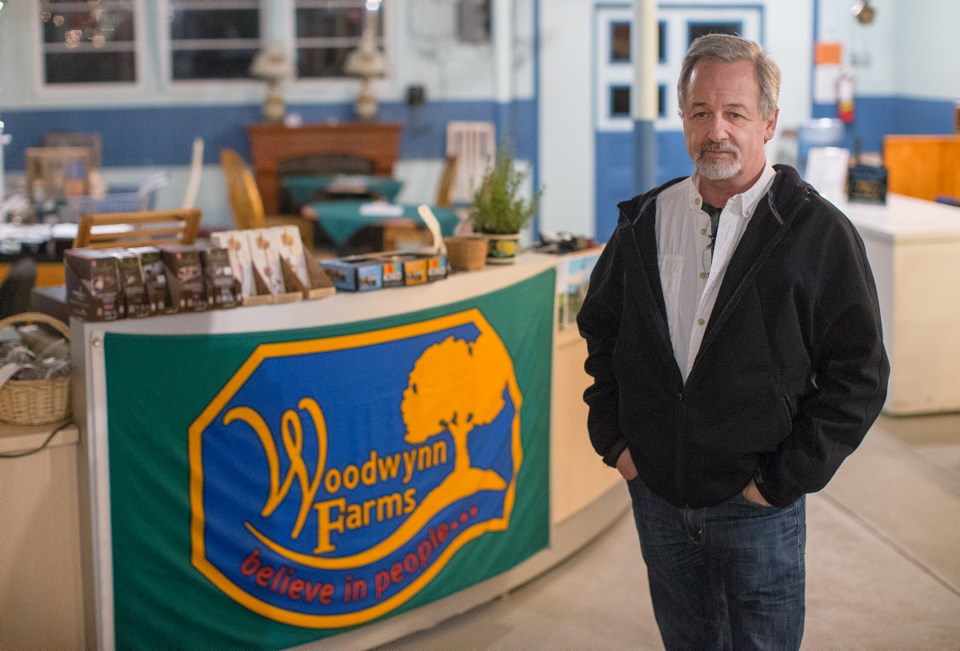The society that owns Woodwynn Farms has not filed an annual report since 2015 and is deemed to be “not in good standing” with B.C. Registry Services.
No board member with the Victoria-based Creating Homefulness Society could be reached Friday.
Woodwynn Farms’ days as a therapeutic treatment centre for people battling addiction, mental health issues and homelessness appear to be numbered. The company holding its mortgage launched a foreclosure action Wednesday.
The numbered company said in its petition to the court that it is owed a total of $5.3 million, representing $4.6 million from the original 2009 mortgage and the rest in interest.
It is asking B.C. Supreme Court for an order allowing it to sell the 78-hectare farm in Mount Newton Valley in Central Saanich.
The lender said it extended the maturity date of the mortgage twice.
Richard Leblanc, who runs the farm for the society, said Friday that the lending company represents three philanthropic Victoria couples, who had allowed the society to forgo mortgage payments.
He said he was not aware that annual reports were outstanding at B.C. Registry Services. Provincial legislation requires reports to be filed annually.
“From our end on the farm, we have submitted everything.”
Leblanc referred questions to the society’s board.
Annual reports have been filed with Canada Revenue Agency’s charities directorate, with the most recent for the year ending March 31, 2017.
Leblanc said people have been stopping by the farm’s market and asking what they can do to assist. “We have not formulated a plan on how people can help us tangibly.”
A meeting is planned for Monday with society board members, he said.
Sales at the farm, which has a market, have quadrupled between April 2017 and today, compared with the same time a year earlier, Leblanc said.
Woodwynn has four residents receiving treatment at the farm, he said. The province pays $650 per month for each.
The goal had been to increase that to 40 residents and bring in more money.
But B.C.’s Agricultural Land Commission and Central Saanich would not permit that. Safety concerns led to “no occupancy” notices served on trailers on the property in December after a fire.
Ryan Windsor, mayor of Central Saanich, said the announced foreclosure was unexpected, although he would not call it a “surprise.”
Windsor said Central Saanich council held a meeting with the Woodwynn board several weeks ago. Councillors were told an announcement was imminent, but no clue was offered about what it might be.
He now assumes whoever put up the money to buy the land for the therapeutic farm gave up after attempts to build residences on the land were unsuccessful.
Windsor said his greatest concern on learning the land is going to be sold was the fate of the four participants now in the Woodwynn program.
“The [Woodwynn] board assured us those people would be taken into a safe and stable environment to continue their progress,” he said.
Windsor said he has no idea what will happen with the land. His council hopes it will be used for agriculture.
He said he would not like to see a marijuana farm. But provincial authorities have already decided marijuana cultivation is legitimate agriculture so there is little the municipality can say.
Woodwynn neighbour Karen Harris said ideally she would like a public trail around the property, with new owners leasing off portions of it to those who are trying to find land to farm.
She said much of the property has not been used as farmland, allowing weeds to flourish and invade her land, and putting it at risk of fire.
Rob Reid, a Victoria businessman who worked to get Woodwynn Farms up and running in 2009, puts most of the blame for its failure on the lack of support from local politicians.
“There were road blocks along the way from Central Saanich,” Reid said.
“It was a matter of trying to get all the pieces together with some politicians who were willing to think outside the box.”
He said his memories of the farm and its dedicated volunteers are nothing but good.
“It became a real strong community of volunteers and the farm was never as active as a farm until it was Woodwynn Farms,” Reid said.
A previous verson of this story misstated the size of the farm; it is 78 hectares.



